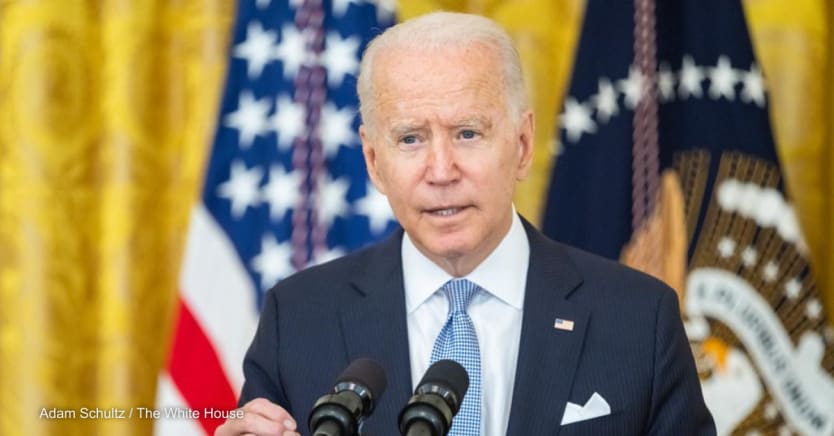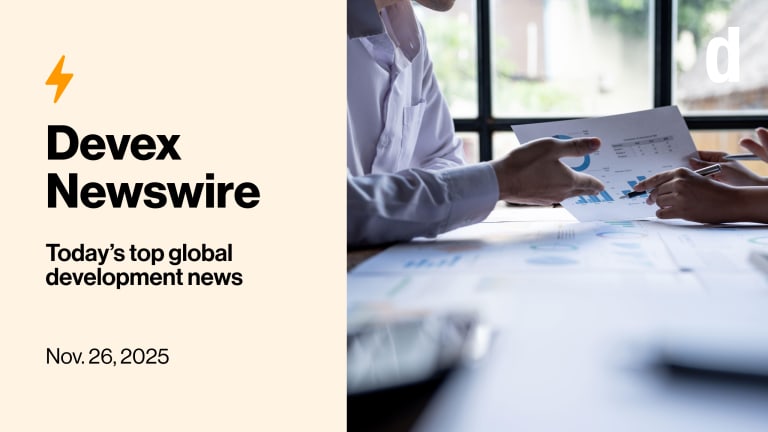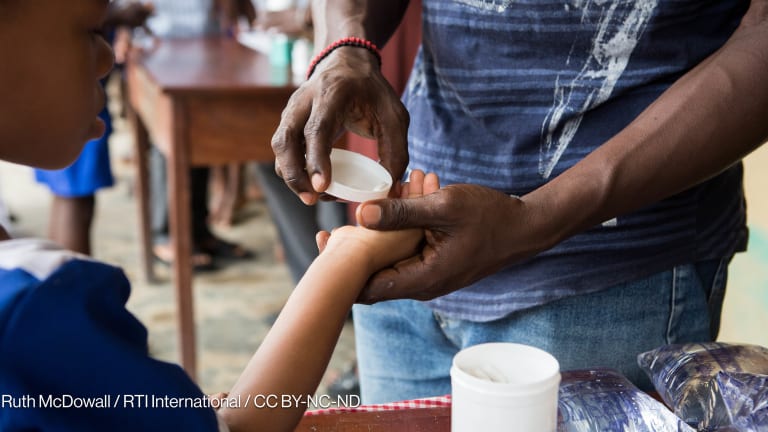
President Joe Biden put U.S. leadership center stage and pledged to end the COVID-19 pandemic by 2022, sparking hope that a global and coordinated effort was taking shape nearly two years into the crisis — even as skepticism abounded about translating his promises into reality.
Speaking Wednesday during a virtual COVID-19 summit he convened as the United Nations General Assembly took place in New York, Biden urged world leaders, civil society groups, business leaders, and pharmaceutical companies to “go big” in working together to fight the pandemic. He promised to boost the United States’ COVID-19 vaccine donations by another 500 million doses by mid-2022, bringing Washington’s pledge to more than 1 billion, and called on other wealthy nations to increase their own commitments.
Coinciding with the 76th annual U.N. General Assembly, Devex will convene U.N. agency heads, government leaders, development practitioners, and private sector actors to discuss the most effective ways to build back better. Register here for our daily events.
The meeting featured leaders from around the world, including Indian Prime Minister Narendra Modi and outgoing German Chancellor Angela Merkel, along with organizations such as the Global Fund to Fight AIDS, Tuberculosis and Malaria and the Bill & Melinda Gates Foundation. Many of the speakers submitted prerecorded videos, leaving little opportunity for real-time discussion.
Several observers who attended stressed to Devex that “the right things were said,” but an overarching concern remained that promises made now may not be kept — just as many vaccine pledges for lower-income nations have failed to materialize.
“This was a critical moment to reset our collective ambition to end the pandemic. And I think on that front, the summit was a success, because up until now we have failed to solve this as a global community,” said Carolyn Reynolds, a co-founder of the Pandemic Action Network.
But she insisted that the heavy lifting still lies ahead. “It’s not enough to have commitment. We need a coordinated plan and leadership. We need a global action plan. We’ve had too much piecemeal,” Reynolds said.
The event was held behind closed doors, even though nothing particularly sensitive was said. Two people described this as a missed chance to create momentum for Biden’s agenda.
The summit looked at a range of health issues, including oxygen shortages, testing kits, and the need for better distribution networks once vaccines arrive in lower-income countries — in addition to the doses themselves, which remain a key concern because of shortages.
However, the event seemed to lack some of the global coordination that would be required to break the logjams of the past 18 months.
Key international finance organizations, including the World Bank and the International Monetary Fund, were not present. Two people with knowledge of the matter said World Bank President David Malpass was invited to deliver remarks via a prerecorded video that was not shown at the summit.
‘We need to go big’
Biden on Wednesday echoed the World Health Organization’s goal of hitting a 70% vaccination rate globally by next year. However, only about 4% of the population in Africa has been fully vaccinated so far, and officials — including at WHO — have warned that even a 10% global vaccination rate is unlikely this year.
“This is a global tragedy, and we’re not going to solve this crisis with half measures or middle-of-the-road ambitions. We need to go big,” Biden said in his opening remarks, promising that the U.S. will be the world’s “arsenal of vaccines.”
In a sign of the gap between pledges and results, COVAX, the initiative aimed at ensuring equitable access to COVID-19 vaccines, earlier this month revised its projections for available doses this year downward by about a quarter, from a starting estimate of 2 billion.
“Commitment is one thing; saying they will do it and actually making the donations happen is another,” said Maaza Seyoum, partnerships lead at the African Alliance.
“The lack of urgency is concerning,” she added, noting that most of the 1.1 billion doses the U.S. has pledged will be delivered next year. She stressed that lower-income countries need increased capacity to manufacture their own vaccines domestically.
In his remarks Wednesday, Biden promised to expand manufacturing around the world, which experts say is vital for not only ending the COVID-19 pandemic but also fighting future disease outbreaks.
Only about one-tenth of the hundreds of millions of doses that members of the G-7 group of nations have promised to donate have been delivered and administered, said Robbie Silverman, senior manager of private sector advocacy at Oxfam America.
All you need to know from UNGA 2021
To get on-the-ground coverage, in-depth analysis, and behind-the-scenes reporting from the 76th U.N. General Assembly, sign up for our special edition newsletters.
At the summit, South African and Indian leaders called for other world leaders to support their proposal at the World Trade Organization to waive certain intellectual property restrictrictions, saying this would allow more countries to produce vaccines locally. But leaders from wealthy countries were mum on the subject, Silverman said.
“No rich country actually addressed what those leaders are calling for,” he said. “For us, that is the key to achieve the scope and ambition of the mandate: sharing the vaccine recipe and technical know-how so countries can manufacture their own doses.”
The meeting’s “carefully choreographed” format “didn’t allow give-and-take for more transformative, radical proposals to emerge,” Silverman added.
That resulted in a “missed opportunity” for leaders from wealthy countries to address the vaccine waiver issue, he said.
A ‘real multilateral effort’
Biden’s pledge to boost manufacturing fits into his broader plan for strengthening global health security, including by creating financing mechanisms to support lower-income countries.
However, Amanda Glassman, executive vice president at the Center for Global Development and chief executive officer for CGD Europe, said she was concerned that the money being promised for health security projects falls short of what is needed. “It’s not very ambitious, and that’s a little concerning,” she said.
At the summit, Biden committed to about $1 billion for a global health security financial intermediary fund. But he said he will need to get Congress on board — always a challenge in Washington.
Elisha Dunn-Georgiou, president and CEO at the Global Health Council, said that Biden demonstrated a “real multilateral effort” and that she was pleased the administration was seeking to fit its own efforts into existing global mechanisms to “really make the U.S. part of that global dialogue rather than standing apart.” Like others, she noted a marked shift from the previous U.S. administration’s more chaotic and go-it-alone approach.
Even so, whether the U.S. would be able to push other countries in the direction it wanted was unclear. For example, just ahead of Modi’s trip to the U.S., Indian officials said the country plans to resume its vaccine exports in the next quarter, but the prime minister himself did not make any specific pledge in his address to the summit, participants noted. Also, Germany and other U.S. allies remain staunchly opposed to intellectual property waivers, despite Washington signaling its approval for the idea, with the jury still out on whether relaxing the rules will even boost supplies in the near term.
Moreover, Russia and China were not involved in the summit, with Beijing pushing its own vaccine diplomacy projects around the world.
In the immediate term, advanced economies have to “fulfill the donations that they’ve committed to” and “swap their near-term deliveries” to help lower-income nations, argued the World Bank’s Malpass.
“The critical thing is to take the early delivery schedules and make them available to developing countries. … There needs to be a releasing of the options and of the advance purchases by the advanced economies,” he said days before the summit.
“Commitment is one thing; saying they will do it and actually making the donations happen is another.”
— Maaza Seyoum, partnerships lead, African AllianceOf the original 500 million doses promised by Biden, only 160 million have been delivered to lower-income countries. Advanced economies are still hoarding vaccines, tending to release extra doses only at a late stage, close to their expiration dates, and without proper coordination with nations that need them, according to Malpass and others.
Tom Frieden, a former director at the U.S. Centers for Disease Control and Prevention, told a panel ahead of the summit that he was concerned about “a myth that there’s a glut of vaccines coming in 2022.” His outlook was less rosy, saying booster shots and other constraints could hinder planned deliveries.
Frieden told the panel, organized by Physicians for Human Rights, that more pressure needs to be placed on leading vaccine manufacturers to cover the global gap in supply.
Several panelists also expressed concern that “vaccine nationalism” will not be going away soon, leading to scarcity in lower-income countries that markets alone will not resolve.
“A country-by-country approach, a nationalistic approach, is not going to get us out of this pandemic,” said Soumya Swaminathan, a World Health Organization scientist, speaking to the panel.
This is likely why so much depends on Biden, European leaders, and other global officials to create a multilateral road map to get the world past COVID-19.
Michael Igoe and Adva Saldinger contributed reporting.








